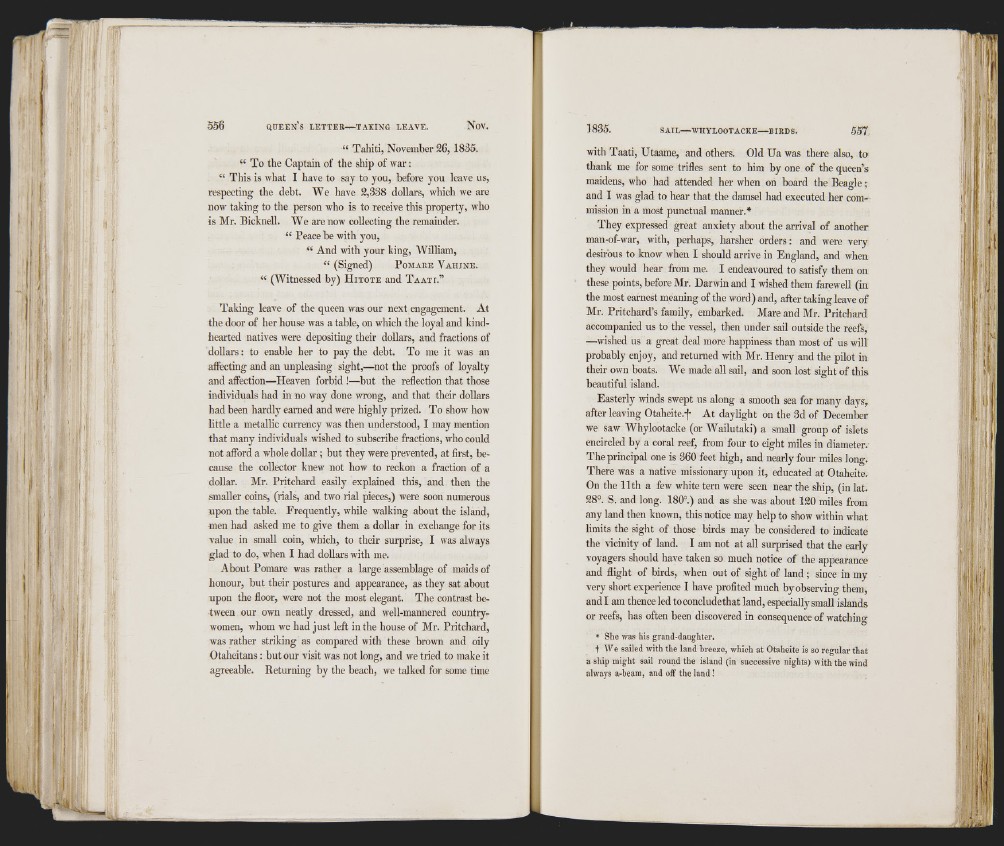
! i f i
a IL
1 :
i i
1
11 r Í 0
' é V
i ' 1 li
S56 QUEENS LETTER— TAKING LEAVE.
“ Tahiti, November 26, 1835.
“ To the Captain of the ship of war:
“ This is what I have to say to you, before you leave us,
respecting the debt. We have 2,338 dollars, which we are
now taking to the person who is to receive this property, who
is Mr. Bicknell. We are now collecting the remainder.
“ Peace be with you,
“ And with your king, William,
“ (Signed) P o m a r e V a h i n e .
“ {^Witnessed by) H i t ó t e and T a a t i .”
Taking leave of the queen was our next engagement. At
the door of her house was a table, on which the loyal and kind-
hearted natives were depositing their dollars, and fractions of
dollars: to enable her to pay the debt. To me it was an
affecting and an unpleasing sight,—not the proofs of loyalty
and affection—Heaven forbid !—but the reflection that those
individuals had in no way done wrong, and that their dollars
had been hardly earned and were highly prized. To show how
little a metallic currency was then understood, I may mention
that many individuals wished to subscribe fractions, who could
not afford a whole dollar ; but they were prevented, at first, because
the collector knew not how to reckon a fraction of a
dollar. Mr. Pritchard easily explained this, and then the
smaller coins, (rials, and two rial pieces,) were soon numerous
upon the table. Frequently, while walking about the island,
men had asked me to give them a dollar in exchange for its
value in small coin, which, to their surprise, I was always
glad to do, when I had dollars with me.
About Pomare was rather a large assemblage of maids of
honour, but tbeir postures and appearance, as they sat about
upon the floor, were not the most elegant. The contrast between
our own neatly dressed, and well-mannered countrywomen,
whom we had just left in the house of Mr. Pritchard,
was rather striking as compared with these brown and oily
Otaheitans : but our visit was not long, and we tried to make it
agreeable. Returning by the beach, we talked for some time
with Taati, Utaame, and others. Old Ua was there also, to
thank me for some trifles sent to him by one of the queen’s
maidens, who had attended her when on board the Beagle;
and I was glad to hear that the damsel had executed her commission
in a most punctual manner.*
They expressed great anxiety ahout the arrival of another
man-of-war, with, perhaps, harsher orders: and were very
desirous to know when I should arrive in England, and when
they would hear from me. I endeavoured to satisfy them on
these points, before Mr. Darwin and I wished them farewell (in
the most earnest meaning of the word) and, after taking leave of
Mr. Pritchard’s family, embarked. Mare and Mr. Pritchard
accompanied us to the vessel, then under sail outside the reefs,
—wished us a great deal more happiness than most of us will
probably enjoy, and returned with Mr. Henry and the pilot in
their own boats. We made all sail, and soon lost sight of this
beautiful island.
Easterly winds swept us along a smooth sea for many days,
after leaving Otaheite.# At daylight on the 3d of December
we saw Whylootacke (or Wailutaki) a small group of islets
encircled by a coral reef, from four to eight miles in diameter.
The principal one is 360 feet high, and nearly four miles long.
There was a native missionary upon it, educated at Otaheite.
On the n t h a few white tern were seen near the ship, (in lat.
28°. S. and long. 180°.) and as she was ahout 120 miles from
any land then known, this notice may help to show within what
limits the sight of those birds may be considered to indicate
the vicinity of land. I am not at all surprised that the eai-ly
voyagers should have taken so much notice of the appearance
and flight of birds, when out of sight of land; since in my
very short experience I have profited much by observing them,
and I am thence led to conclude that land, especially small islands
or reefs, has often been discovered in consequence of watching
* She was his grand-daughter.
t We sailed with the land breeze, which at Otaheite is so regular that
a ship might sail round the island (in successive nights) with the wind
always a-beam, and off the land!
■ if
,1.